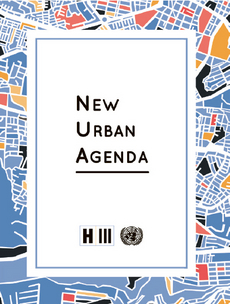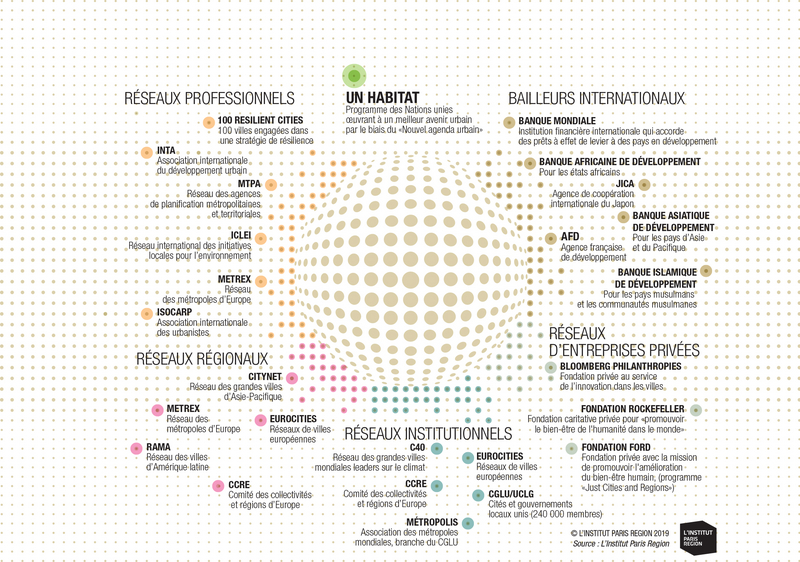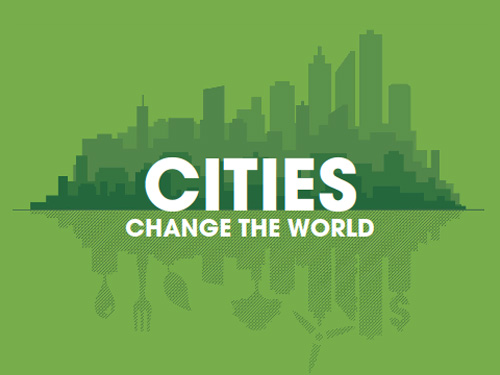Large cities are developping management and coordination bodies on a metropolitan scale. Their power as political authorities is largely based on networks and alliances. International cooperation plays different roles, such as lobbying and “urban diplomacy”. But most importantly, these networks stimulate the circulation of urban models.
The emergence of large cities, which represent over 40% of the world’s urban population, and the complexity of their management, lead actors to seek new modes of governance. The aim is to ensure that they operate effectively, to regulate their economies in order to improve social justice, and to adapt their territories in order to limit their vulnerability and finance their development. The metropolitanisation process calls existing practices into question, altering the scope of intervention and calling for new skills. Networks of large cities or metropolitan areas, urban development platforms combining public and private actors, and international associations whose members are planning professionals, have had to adopt a stance on the issue of metropolitan development and governance. This has given rise to shared concerns regarding the scale on which public policy and planning projects should be implemented, and focusing on new relationships between large cities on the one hand and states and international bodies on the other. Run by non-profit associations, these networks are neutral platforms for exchange and interaction. At a time of major social, environmental, economic and technical transition and indeed disruption, they help to break down the barriers between professionals and elected officials, and to cope collectively with unforeseen situations. The flexibility of these organisations means they can rapidly evolve and support members who require peer-to-peer expertise and advice, within a framework based on learning, experimentation and mutual enrichment.
The evolution of networks and the challenges of metropolitanisation
As separate administrative entities, groups of municipalities or regions, metropolitan cities are playing an increasing role in collegiate organisations representing local authorities within international networks, while the presence of national governments has dwindled. One consequence of this is that the subjects these organisations deal with have evolved. Platforms deal with subjects that are of major concern to cities and which appear in strategic planning documents or arguments presented by elected officials: governance, planning, financing, large structural projects, innovation and smart cities, metropolitan diplomacy, financialisation, vulnerability, food, climate change, social and territorial inclusion, and so on.
Diversity of aims
Several major objectives justify the existence of these networks, such as sharing best practices, territorial marketing, or the lobbying of multilateral organisations. They are resource centres focusing on the challenges and themes relating to metropolitan issues. They train their members and partners, in particular on questions of planning, governance (multi-actor initiatives), and organise collaborative workshops (urbanlabs, etc.) in order to produce innovative projects. As tools for supporting best urban planning practices, they act as forums for exchange and experience via workshops, seminars, conferences and publications, and sometimes also help to fund projects. The networks give regions, in particular metropolitan areas, opportunities to develop their local marketing strategies on an international scale. Metropolitan areas carry out attractiveness- raising policies that lead them to compete on a global scale and actively seek areas for development. Cities can also be found on platforms that bring together public and private members and liaise with global business networks.
Providing metropolitan areas with a voice
Last but not least, metropolitan networks give metropolitan areas a voice in negotiations with state governments and multilateral bodies, earning them recognition as legitimate discussion partners on subjects relating to regional planning. They are thus environments in which international alliances can be constructed between regions that hold strategic economic power and are often operated by major political actors. The New Urban Agenda, adopted following the Habitat III world conference on sustainable urban development in October 2016, acknowledges the importance of local authorities and metropolitan areas as major actors who can help to achieve the UN Sustainable Development Goals adopted in New York in September 2015. Certain platforms communicate on climate change at COP conferences. Shared initiatives are initiated at international events such as the World Urban Forums via the UN-Habitat World Urban Campaign and Climate Chance summits bringing together non-governmental actors working on climate change or other targeted initiatives run directly by one or more networks. Networks of European cities, metropolitan areas and regions lobby the European Commission on fund allocation and the urban development strand of cohesion policy. More recently, 13 organisations gathering together local authorities and associations of authorities wrote a shared letter to the G7 emphasising how vital it is to acknowledge the urban dimension of development and the key role played by local government in finding solutions to global challenges.
Networks need to work better together
Each network has its own identity, and new ones are created all the time. The need for a shared understanding of the metropolitan phenomenon and for transverse approaches and methods means that networks have to work together in order to share and capitalise on their respective acquired knowledge.
Éric Huybrechts, Architect and Urbanist, L’Institut Paris Region
and Lola Davidson, Deputy General Secretary, INTA
THE INTERNATIONAL URBAN DEVELOPMENT ASSOCIATION (INTA)
INTA is an international experience-sharing network in the field of urban and territorial development and an independent knowledge production platform. Originating in the New Town movement of the 1970s, INTA brings together public and private leaders in all sectors of urban development to develop a shared vision of the city of tomorrow and to build a collaborative and participatory programme. It has over 2,000 members and partners in 60 countries, including L’Institut Paris Region. The work carried out by its members on the subject of metropolitan development focuses on these main questions:
- How should private and public actors be mobilised on different geographical scales?
- How can we develop urban projects that are meaningful on a metropolitan scale?
- What kind of metropolitan infrastructures are required?
- How can territorial inequalities be corrected within metropolitan areas?
- How can metropolitan areas differentiate themselves in order to avoid the risk of standardisation?
- How should we approach urban/suburban and urban/rural relationships? What is the responsibility of the metropolitan area with respect to adjoining and interdependent areas?
These questions gave rise to a programme of discussions focusing on metropolitan strategies in transition (2011-2015) in partnership with the Deltametropool Association (which plays an active part in the development of the Randstad in the Netherlands), and to metropolitan planning discussions on a European scale (2015-2016) focusing on two main subjects: innovative economic development; and social cohesion and territorial equity. A conference entitled Métropoles européennes, stratégies et gouvernance (Major European cities: strategies and governance) was also organised with the Paris City Council to initiate Europewide dialogue on the Grand Paris metropolitan development scheme. Last but not least, in the framework of a multi-year programme (2015-2016, then 2018-2020) on the implementation of the Sustainable Development Objectives and the New Urban Agenda, the network focuses on the issue of solidarity between cities and metropolitanised territories (suburban and rural areas) based on the principle of reciprocity, which raises questions on agricultural and industrial production chains, modes of governance, and the social responsibility of certain actors (private fi rms and local authorities).
METROPOLITAN AND TERRITORIAL PLANNING AGENCIES GLOBAL NETWORK (MTPA)
The MTPA network was launched at the Habitat III conference initiated by the national federation of the French planning agencies (FNAU), the network of the Moroccan urban planning agencies (MAJAL), the network of the Mexican urban planning bodies (AMIMP), and several urban planning authorities including L’Institut Paris Region, the Beijing Institute of Urban Planning and Design, Urbalyon, the Regional Development Agency of de District of Bamako, the Los Angeles Metropolitan Planning Organization, Emplasa (São Paolo) and the Yangoon Urban Planning Bureau.
MTPA organises thematic debates, in particular at international events such as the Climate Chance Summit (Agadir), the World Urban Forum (Kuala Lumpur), and the FNAU conference on Europe and Territories (Strasbourg). It expands its network by developing partnerships, for example with UN-Habitat, Metropolis, Habitat Professional Forum, Isocarp, etc.
MTPA stands apart from existing networks run by political stakeholders thanks to its technical focus on territorial engineering, and because it mobilises groups of professionals working in territorial planning agencies or institutes. Although modes of metropolitan governance are sometimes unstable, technical expertise is always necessary to support decision-making and build knowledge of these complex territories. This means that these organisations must be stable enough to manage data, build knowledge, and provide the cross-functional expertise required by metropolitan projects. The role of MTPA is to engage in debate on the technical aspects of metropolitan planning, to support the creation of metropolitan planning agencies, and to emphasise how important these agencies are in supporting the management and development of metropolitan areas. To achieve this, it sets up exchange programmes, urbanlabs, task forces and shared databases on best practices, and takes part in international discussions on urban and territorial planning issues.


